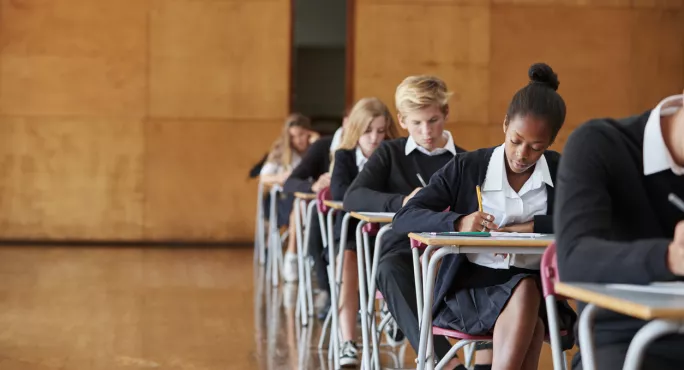GCSE league tables: ‘Schools thrown to the wolves’

Schools are being “thrown to the wolves” by the government’s decision to publish GCSE league tables this year despite Covid disruption, a leading headteacher will say today.
The Association of School and College Leaders’ president, Pepe Di’Iasio, will criticise the Department for Education in his speech to the union’s annual conference, which gets underway this morning.
A new poll of school and college leaders shows that more than 80 per cent are against the move to publish performance tables based on this summer’s exam results, achieved by students who will have faced two years of upheaval as a result of the pandemic.
- Exclusive: Call for league table probe after Covid disruption
- GCSEs 2022: How exams will be run this summer
- Exclusive: The value of league tables under official scrutiny
Mr Di’Iasio will say: “The government must rethink its plan to publish key stage 4 and post-16 performance tables based on this summer’s exams.
“How can it be right to compare the performance of one school or college with another when they have been so differently affected by the pandemic over the last two years?”
GCSE league tables ‘should not be published’
Out of 1,410 ASCL members who responded to the survey, 82.6 per cent did not agree with the decision to publish league tables, while 10.4 per cent did agree and another 7 per cent were not sure.
The DfE has said that it will ensure that messages accompany the published tables to “advise caution when considering the 2021-22 data”.
This will include strongly discouraging users of the data from drawing comparisons with performance data from previous years.
But Mr Di’lasio will say: “Surely, if the data is unreliable, the obvious answer is not to publish it in the first place.
“This is not a small matter. Careers and reputations are affected by performance tables. Newspapers publish them.
“It feels as though we are being thrown to the wolves by the government’s insistence on going ahead with this misguided and counterproductive policy.
“That is a pretty terrible way to treat a profession which surely deserves more respect after the last two years.”
The DfE has decided not to publish key stage 2 performance tables, based on Sats taken by Year 6 pupils in primary education, for the 2021-22 academic year.
However, it has ruled that results from key stage 4 qualifications, such as GCSEs, and post-16 qualifications, such as A levels, will be used in performance tables.
The concerns over this year’s league tables come as the Office for Statistics Regulation is carrying out an assessment of whether the government’s performance data complies with national standards.
This is a routine assessment that will look at both national performance and school-level data.
Two-thirds of school and college leaders who responded to the ASCL survey said they agreed with the government’s approach to running exams this summer.
Students are due to sit formal summer exams in GCSEs and A levels this year for the first time since 2019, following the cancellation of exams in 2020 and 2021 due to the pandemic.
Adaptations have been made to this summer’s exams to try to make them as fair as possible after all the Covid disruption, such as advance information being provided on some of the exam content to help students focus their revision.
This year, in all subjects, with the exception of English literature, history, ancient history, geography and art and design, students will be given notice about the topics to be covered in this summer’s exams.
In GCSE maths, combined science and physics, students will be given equation sheets to reduce the number of equations they need to memorise.
And in GCSE English literature, history, ancient history and geography - subjects where advance information will not be released - students will study and be examined on fewer topics.
School leaders who agreed with the government’s approach to running exams this summer cited the following reasons: externally marked exams are the fairest way of assessing students; the need to return to normality again; there is no perfect solution this year but the chosen approach is the fairest in the circumstances; and the difficulty in standardising other assessment systems nationally.
Those who disagreed with the government’s approach said it would not create a level playing field because schools have suffered different levels of Covid disruption, and said they were concerned that disadvantaged students had been particularly badly affected.
You need a Tes subscription to read this article
Subscribe now to read this article and get other subscriber-only content:
- Unlimited access to all Tes magazine content
- Exclusive subscriber-only stories
- Award-winning email newsletters
Already a subscriber? Log in
You need a subscription to read this article
Subscribe now to read this article and get other subscriber-only content, including:
- Unlimited access to all Tes magazine content
- Exclusive subscriber-only stories
- Award-winning email newsletters
topics in this article



